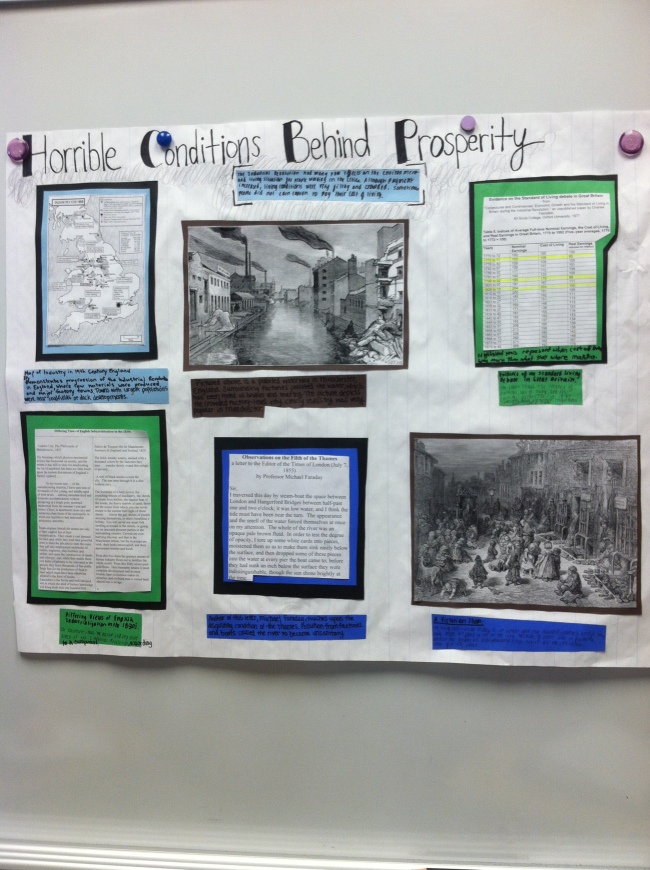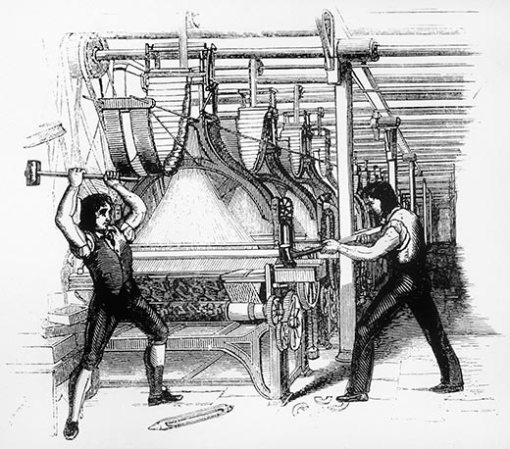After curating an exhibit for the first time, it’s clear that the analysis portion is the most important. Analysis includes looking at the sources of each piece, relating each piece to the topic of the exhibit, and putting it in context with other sources. Without looking at sources and interpreting the importance of each piece, the exhibit will have incorrect information. It’s also important to understand what you are displaying as a curator before you present it. The exhibit I curated is shown below. The title helps portray the main theme of the exhibit: environmental and social repercussions of the Industrial Revolution in England. My group wanted a catchy title that created interest and summarized the exhibit. After brainstorming, “Horrible Conditions Behind Prosperity” was the unanimous vote. The map of England’s industry at the top left, the drawing of the polluted Thames River, and the display of a Dudley street slum are the three visuals in the exhibit. Each source gives a visual representation of the impact on the environment and people living in industrial cities. The source below the map has two opinions (by Andrew Ure & Alexis de Tocqueville) on the behaviors of workers in Manchester. Both men say that factory workers are somber, some are very rich but no one seems happy or goes out to have a good time. The chart in the top right corner (by Charles Feinstein) correlates with the aforementioned opinions. The chart shows how low the incomes of workers were compared to the cost of living. Obviously people were not happy at this time in fear of poverty and the strenuous work hours.
Visitors of the exhibit will learn that although the Industrial Revolution was a time of growth and prosperity, there were also negative effects. The environment took a huge blow from the increase of pollution due to factories and coal-powered transportation. Along with environmental stresses, visitors will see and understand the horrible lifestyle and salary of workers living in England at the time. Poverty and filth was an issue for factory workers and their families. The exhibit had many interesting pieces displayed, and succeeded in informing viewers of the negative side to the Industrial Revolution.

As a visitor, I saw four different exhibits focusing on other subjects related to the Industrial Revolution in England. The first exhibit I visited, “Experiences and Hardships of Child Labor”, gave a presentation on the hardships of child factory workers in the nineteenth century. According to a chart of factory workers in 1818, 50% were children under 10. Obviously children had no desire to work (due to the hard labor), but poverty forced their families to send them for the extra money. The second exhibit was a little less intense, and focused on the gigantic cotton demand during the Revolution. Maps and graphs showed the slave populations drastically increase because of the demand for raw cotton in Britain, which was the largest exporter of cotton goods in the world. “Cloth Through the Ages, Many Different Stages” showed the actual form of cotton goods being made, contrasting the old way of spinning wool at home to the new technology used in factories. The spinning Jenny and textile mills were much more effective and cheap, but the older technology was much more family-friendly and comfortable for country people. The last display I visited was informative on the new types of transportation invented, like railroads and steam engines. I found it amusing how such simple technology nowadays, like railroads, were found astonishing. One article on the exhibit, written by Samuel Smiles, praised railroads and the first line of his letters starts, “The iron rail proved a magicians road.” Being a visitor to each of the exhibits was a great way to learn more about the Industrial Revolution.

